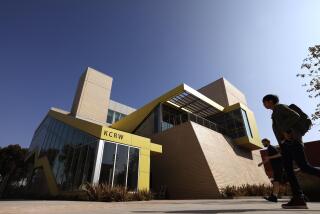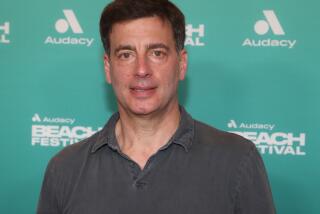New Notch for Infinity : KRTH Acquisition Continues Radio Group Owner’s Trend
The 1980s never ended at Infinity Broadcasting.
The New York-based radio station group owner, best known as the company that produces and distributes the raunchy Howard Stern show, earlier this week agreed to pay $110 million for KRTH-FM in Los Angeles, the highest price ever for a radio station.
Paying top dollar is nothing unusual for Infinity, a company that is gobbling up stations in a drive to become the largest radio group broadcaster in the country. For Infinity, KRTH-FM is just another notch in its belt.
“This is the equivalent of buying a Picasso,” said Gary Stevens, a New Canaan, Conn.-based radio station consultant. “It’s entirely consistent with Infinity’s pattern of acquisitions, which is to buy highly successful stations in large markets.”
Infinity owes much of its growth-by-acquisition strategy to the Federal Communications Commission, which last year relaxed regulations limiting the number of radio stations companies can own. Under the new rules, a broadcaster is allowed to own 18 FM and 18 AM stations. And those caps will be raised to 20 FM and 20 AM next year. Most significantly, the new rules also allow ownership of two FM and two AM stations in the same market.
In the highly competitive world of radio broadcasting, where stations in large cities such as Los Angeles battle over fractions of the audience, Infinity’s outlets regularly rank first or second in their target demographics, garnering 3% or more of the listeners.
Infinity’s purchase of KRTH-FM also emphasizes the long-term trend of increased concentration of radio stations into the hands of a few major operators. That is expected only to accelerate now that broadcasters can own up to four stations in the same market, thereby realizing economies of scale as administrative staffs and overhead are consolidated.
“You got a situation where consolidation is happening all over the country,” says Ben LaRue, a Beverly Hills media broker. “It started in the small and medium-size markets and has now spread to the larger markets.”
At present, Infinity owns 21 radio stations, including KROQ-FM in Los Angeles, and has a deal pending to buy WIP-AM in Philadelphia for $15 million. The KRTH-FM deal exceeds Infinity’s 1991 purchase of WFAN-AM in New York for $70 million.
The company is now breaking out into the potentially lucrative radio program syndication business. “Shock jock” Howard Stern, whose base is Infinity-owned WXRK-FM in New York, is now in 10 markets around the country. The Infinity syndicated radio program stable incudes Don Imus, “The Greaseman,” and former Watergate burglar G. Gordon Liddy.
“In radio, successful programming all depends on personalities,” said Farid Suleman, Infinity’s chief financial officer.
The driving force behind Infinity is Chief Executive Mel Karmazin, a veteran radio industry executive. Throughout the 1970s, Infinity grew by buying under-performing stations in major markets, turning them around and then “trading up” to larger stations.
Now Infinity buys only successful stations and tends to leave them alone, giving the local management a considerable degree of autonomy as long as the ratings hold up.
But the growth has not come without cost. Infinity today owes a total of $475 million and projected interest of $45.5 million this year. Last year, it reported a net loss of $21.8 million, in part as a result of extraordinary charges of almost $19 million due to restructuring, debt redemption and other costs related to going public in 1992.
That has not deterred Wall Street from pushing up Infinity’s stock price. Earlier this year, Infinity issued 3.2 million new shares and raised about $90 million. Its stock, which traded as low as $23 a share earlier this year, is now at $38.25, just under its all-time high of $39 a share.
Media companies, however, are often judged on their ability to generate cash flow rather than net income. Suleman says the operating margins at Infinity’s radio stations are typically 45%, compared to the industry average of 35%. Total cash flow, which was $68.5 million in 1992, is estimated by UBS Securities to increase to $94.6 million this year.
Indeed, successful radio stations can be a financial bonanza. The average number of employees at each of Infinity’s 21 stations is 40. At KRTH-FM, there are 43 full-time employees. Last year, KRTH-FM had $22 million in revenue and this year expects that to reach $25 million to $26 million, says Suleman--or about $581,000 in revenue for every employee.
The long-term strategic goal, says Suleman, is to reach the maximum number of 42 stations allowed under federal regulations. But that becomes more difficult as time goes on, since most of the big radio stations are already owned by major group operators who don’t want to sell.
“It may take a while, but there are still opportunities out there,” he said.
Megabucks in Megahertz
Here are the 10 largest radio acquisitions, in millions:
Deal Money Date KRTH-FM/Los Angeles to Infinity $110.0 1993 KRTH-AM & FM/Los Angeles to Beasley 86.6 1989 KJOI/Los Angeles to Viacom 86.0 1990 KVIL-AM & FM/Dallas to Infinity 82.0 1987 WFAN/New York to Infinity 70.0 1991 KMJQ/Houston to Noble 65.0 1988 WWJ & WJOI/Detroit to CBS 58.0 1988 KIQQ/Los Angeles to Westwood One 56.0 1988 KFAC/Los Angeles to Evergreen 55.0 1989 KTRH and KLOL/Houston to Evergreen 51.0 1992
Note: KRTH-AM is now KKHJ; KIQQ is now KQLZ; KFAC is now KKBT; KJOI is now KXEZ
Source: Radio & Records; Times reports
More to Read
The biggest entertainment stories
Get our big stories about Hollywood, film, television, music, arts, culture and more right in your inbox as soon as they publish.
You may occasionally receive promotional content from the Los Angeles Times.










